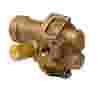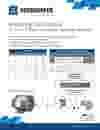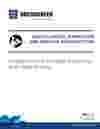Exceptional Features:
Sturdy, corrosion-resistant bronze construction
Space-saving close-coupled design
High-strength stainless steel shafts
Quiet operation with durable bronze helical gears
Maintenance-friendly, process-lubricated carbon graphite bearings
O-ring cover seal ensures comprehensive leak protection
Choice of lip seal or mechanical seal for versatility
Designed for easy field assembly compatible with various motor frames
Additional Options:
For DC motor pump units, please refer to N992 DC
For AC motor compact units, see our Close Coupled Bronze Adapterless Rotary Gear Pumps
For hydraulic motor-driven pump units, check out Adapter 9960
For bronze pedestal pumps, explore Model N2000
For close-coupled ductile iron pumps, consider Model C992
Liquid Compatibility and Temperature Guidelines
Our pumps efficiently handle liquids that are non-reactive with bronze, such as water, oil, and mild chemicals within a pH range of 4 to 11. Viscous liquids should be pumped at reduced shaft speeds, no higher than 1150 RPM; consult our factory for advice. We do not recommend using these gear pumps with liquids containing solids, abrasives, powders, or paint pigments. If necessary, operate at very low speeds to reduce pump wear. Refer to our price book for specific temperature ranges for lip and mechanical seals. For extreme temperatures or to prevent freezing damage in water-filled pumps, please consult our factory. Note that oils may require a lower speed or more power when at low temperatures due to increased viscosity.
Suction Lift and Installation Advice
To achieve optimal suction lift, install the pump as close as possible to the liquid source. When new, the pump can lift water up to 20 feet (6.1 m) in the suction line. We suggest using a foot valve with a strainer at the start of the suction line to ensure reliable priming and to prevent dry running. The minimum suction pipe size should match the pump's inlet port. For longer suction lines or viscous liquids, opt for a larger pipe to ensure efficient flow.
Relief Valve and Rotation
If your system includes throttling devices like valves or nozzles, a relief valve should be installed to reroute liquid back to the suction side or tank to prevent overpressure. While R-model pumps come with a built-in relief valve, these are only for intermittent use as continuous operation can cause overheating. The built-in valve is a safety feature, not a flow control device; for regulating pressure or flow, install a separate relief valve in the pressure line.
The factory default setting supplies the pump for counterclockwise rotation from the shaft end. If you reverse the motor, you'll need to adjust the "in" and "out" ports and reposition the relief valve, which is always situated on the inlet side for this series. The factory-set pressure is 50 PSIG (3.4 bar), adjustable by turning the relief valve screw clockwise for higher pressure settings.





![Data Sheet - N992 [EN].png](https://azure-na-images.contentstack.com/v3/assets/blteeb7049ce5a07fbd/blt671f33b7e3d4a8eb/693ad341dbd68b62172fc227/Data_Sheet_-_N992_[EN].png?format=pjpeg&width=100&quality=10)
![Data Sheet - N992-32 DC [EN].png](https://azure-na-images.contentstack.com/v3/assets/blteeb7049ce5a07fbd/blt344e4f6d452629ba/693ad341db581b5032d402c3/Data_Sheet_-_N992-32_DC_[EN].png?format=pjpeg&width=100&quality=10)
![I and O - Using a Gear Pump Repair Kit (Carbon Bearings) [EN].png](https://azure-na-images.contentstack.com/v3/assets/blteeb7049ce5a07fbd/blta2fd365eb3078311/693ae8b33141c42fb6ebd85b/I_and_O_-_Using_a_Gear_Pump_Repair_Kit_(Carbon_Bearings)_[EN].png?format=pjpeg&width=100&quality=10)

![I and O - Bronze Rotary Gear Pumps [EN].png](https://azure-na-images.contentstack.com/v3/assets/blteeb7049ce5a07fbd/blta801c8f128d00552/693ad354934aeb23b81de30b/I_and_O_-_Bronze_Rotary_Gear_Pumps_[EN].png?format=pjpeg&width=100&quality=10)

![Brochure - Marine [EN].png](https://azure-na-images.contentstack.com/v3/assets/blteeb7049ce5a07fbd/blt742dd4b78b9b1393/6932c8519914a384bd745af7/Brochure_-_Marine_[EN].png?format=pjpeg&width=100&quality=10)
![Quick-Pick Selection Charts [EN].png](https://azure-na-images.contentstack.com/v3/assets/blteeb7049ce5a07fbd/blt0e2c980cfa46efb4/6932b9ebf6621c0055387bd6/Quick-Pick_Selection_Charts_[EN].png?format=pjpeg&width=100&quality=10)
![Quick-Pick Selection Charts [EN] (metric).png](https://azure-na-images.contentstack.com/v3/assets/blteeb7049ce5a07fbd/blt54f1dfba1861a89d/69410ba43249574056e1d73d/Quick-Pick_Selection_Charts_[EN]_(metric).png?format=pjpeg&width=100&quality=10)